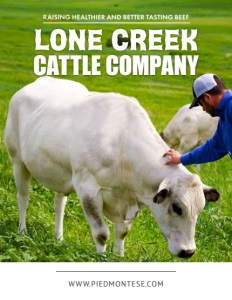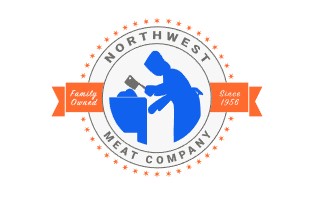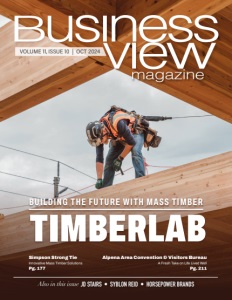Lone Creek Cattle
Raising healthier and better tasting beef
Devoted to innovation and stewardship
The beef industry had become Nebraska’s single largest, driving much of its economy, a fact represented in its license plates, which carried the nickname “The Beef State.” Cattle ranching has evolved over the years, perhaps reaching its consummate 21st century iteration at the Lone Creek Cattle Company, a family-owned and operated cattle business with headquarters in Lincoln, Nebraska and allied ranches situated throughout the western part of the state.
“Lone Creek has been around for about 15 years,” says Procurement Manager, Thad Robertson. “It came from our owners’ desire to have a high-quality, healthy product. They were able to purchase a company that had the highest conglomeration of the Italian-Heritage Piedmontese breed, which originated tens of thousands of years ago in the Alps in northern Italy. It’s the only cattle breed in the world that produces both tender and lean beef, which is a product of their genetics.”
Leading the cattle industry
There are two sides to Lone Creek’s operations: the cattle side and the meat side. Robertson manages the cattle side, which leases high quality, full-blood, Piedmontese breeding bulls to qualified producers and ranchers, who, in return, contract to sell back to the company any calves produced from those matings. It’s a system that benefits both parties. “Ranchers have a market for their calves before cows are bred,” Robertson explains. “ Lone Creek has built our own supply chain through those breeding activities. As soon as a bull steps on the trailer to breed, I’m projecting that progeny to harvest. It takes five years from developing the bull, to breeding the cows, to raising the calf, to getting it where somebody can enjoy it.
“The bulls that Lone Creek lease’s have to be two-copy, full-blooded, Piedmontese bulls,” Robertson continues. (Two-copy, or homozygous, means an animal has inherited the same alleles of a gene from each of its parents.) “The very specific gene that belongs to the Piedmontese breed is the C313Y gene, a naturally-occurring mutation. If you breed a two-copy bull with any commercial cow, that bull is always going to pass along one copy of that gene. And it has been found that one copy of the C313Y gene is enough to impact the quality of the beef both in tenderness and leanness.”
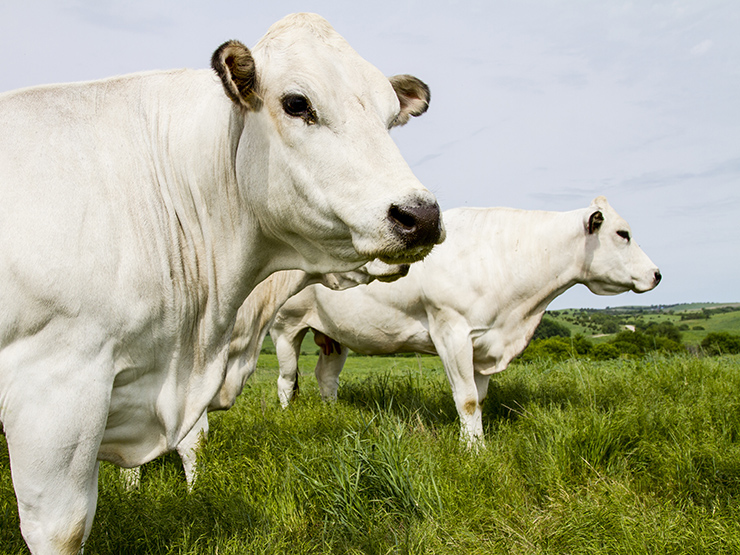
Looking for progressive partners
Ranches that are chosen to participate in Lone Creek’s breeding program go through a strict vetting process and must adhere to vaccination and weaning guidelines set by the company. “This is a very progressive beef company and we’re looking for ranchers who are currently doing business a little bit differently, or want to, and are willing to look at a breed like the Piedmontese, which is not widely known,” Robertson relates. “So, we go in and we help them develop their business: the breeding activity, the time of year that they’re breeding, what they’re feeding their animals. We look at all of these different aspects of their business to determine the best outcome for their success.”
When Robertson says that Lone Creek is progressive, it means, among other things, that: their cattle are raised with humane, low-stress handling techniques and without the use of antibiotics, steroids, or hormones; it employs cutting-edge research in animal science and stockmanship; it utilizes modern ranching protocols, such as EID (Electronic Identification) tagging technology, database tracking initiatives, and DNA testing to confirm heritage; and it adheres to the five fundamental principles that promote healthy soil for its grass-fed herds – minimizing soil disturbance by decreasing tillage and chemical additives; keeping soil covered to protect against erosion and improve water retention; increasing biodiversity in pastures, including microbial, flora, and fauna; maintaining a year-round root system; and integrating grazing and other animal management practices to improve soil fertility.
“We’re very passionate about land management,” Robertson declares.
“In my opinion, farmers and ranchers are the biggest environmentalists we have in this country because it’s their livelihood. They rely on the land and the animals to survive, so they’re absolutely passionate about taking care of those two items. For example, as a grass-fed company, we have to be good stewards of the grass when we have it, and manage those pastures very intentionally through the spring, summer, and fall months, so there’s grass in the winter for the cattle to consume.
Becoming a retail outlet
Ben Mohl is Director of Marketing, the other side of Lone Creek’s business, which supplies between 300-400 cattle a week to the market. Formerly, almost all of its cattle went to wholesale processors, but today, its own processing, cold storage, and warehouse facilities allow the company to sell about 10% of its product line directly to consumers via its website. “As our Certified Piedmontese Beef is a niche program, representing less than half a percent of the cows that are out there, picking up retailers that want to carry leaner beef isn’t always easy,” Mohl explains. “So, we said, ‘if we can just sell it ourselves, we can reach all other parts of the country where consumers do not have ready access to our beef in the grocery store.’
“When we started selling online, about five years ago, we had a small building on our campus that houses our online fulfillment building and we were at ten orders a week; then 20 orders a week. When we got to 50-100, COVID hit and it jumped to hundreds a week. So, COVID accelerated our ecommerce growth, as opposed to a reason why we jumped into it. I’m not going to say COVID was a blessing by any means, but it gave consumers a lot of trust in buying beef online and having it shipped to their door, while realizing that the beef they get at the grocery store doesn’t always imply that it’s fresher than the beef that can be shipped frozen to their doorstep,” he notes.
“As we got past COVID and built our new warehouse, we moved all of our online fulfillment into a larger facility that can accommodate a couple of thousand orders a week. Over the holidays, we capture close to 40% of our yearly sales in that span of six to eight weeks over November and December. Along with a lot of aggressive marketing to reach new customers, we’re now at a very good spot, complementing our wholesale business with our e-commerce sales.”
“Today, we sell to all fifty states in the country and we’ve seen a 25-30% growth for each of the last six years. The vertical integration of the supply chain really helped us maintain growth in a very volatile and competitive market. And the demand continues to grow. The only real struggles we had, at times, were not having enough cooler boxes or dry ice. Now, we just installed our own dry ice machine to eliminate some of those problems. By shipping two-day air in recyclable coolers and maximizing the dry ice we can put in, we operate, for the most part, with a lot of efficiency, getting frozen beef all the way to people’s front door no matter where they live in the country.”
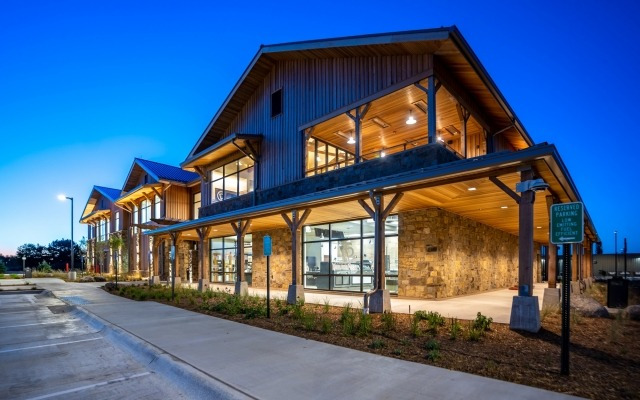
Going the final mile
Since its inception, Lone Creek’s cattle have been raised on a 50/50 grass/grain diet. But Robertson reveals that that is soon going to change — the company is in the middle of sunsetting its grain-fed program and switching to a 100% grass-fed, grass-finished protocol.
“I think that’s the most exciting thing happening on the cattle side,” he states. For the uninitiated, there is a major difference between beef that is grass-fed and those that are grass-finished. Simply put, grass-finished beef comes from cattle that ate nothing but grass and forage for their entire lives. Grass-fed, on the other hand, may be used to label meat from cattle that were started on a grass diet but have either received supplemental grain feed, or are finished on a fully grain-based diet.”
“In fact, many grass-fed cattle spend the last few months of their lives eating grain in feedlots to help them quickly gain weight. Grass-finished beef is 20% lower in calories than grain-finished beef and has higher levels of Omega-3 fatty acids, Conjugated Linoleic Acid — an essential fatty acid that fights cancer and inhibits body fat — and Vitamins A and E.”
“The amount of effort it has taken over the last eight years to get to that point is really exciting,” Robertson adds. “You never really know how the market is going to react when you’re doing something as big as what we’re doing right now. Pulling the ranchers along with us, is really a testament to how forward-looking they are, because ranchers are generally rooted in tradition and it is hard, at times, to get them to change because they’ve done things the same way for generations. So, it’s really exciting to see all of our suppliers come with us on this journey.”
From the sales and marketing side, Mohl agrees. “Our focus is on growing our grass-fed, grass-finished sales,” he reports. “For us, being an American producer of a 52 week supply of grass-fed, grass-finished tender beef that actually tastes great is what we hang our hat on. That remains our goal – a very large and substantial growth in the US retail market, both in private label opportunities that we’ve offered to some retailers, and selling our own Certified Piedmontese brand of beef. So, we’re all in on grass-fed, grass-finished beef, showing that it can be done here in America with world-class quality.”
An industry leader
Going forward, the Lone Creek Cattle Company plans to continue to combine the traditional care and husbandry standards of quality stockmanship with the industry’s leading science in genetics and reproduction to benefit both ranchers and consumers. Its unwavering commitment to quality, sustainability, and innovation makes it a leader in the beef industry, and its dedication to providing healthier, tastier beef, while safeguarding the environment and promoting ethical practices, sets a new benchmark for the future of cattle ranching.
“I’ve traveled all over the world for this company, and I’ve got to witness a lot of different beef companies,” says Robertson in conclusion. “And what we have, I would venture to say, doesn’t exist anywhere else in the world. It’s unbelievable.”
AT A GLANCE
Lone Creek Cattle Company/Certified Piedmontese Beef
WHAT: An innovative farm-to-fork cattle company
WHERE: Headquarters in Lincoln, Nebraska
WEBSITE: www.Piedmontese.com
PREFERRED VENDORS
Northwest Meat Company – www.chicagowholesalemeats.com
Northwest Meat is a proud family-owned business dedicated to delivering premium quality meats with a personal touch. Combining time-honored traditions with modern practices, we ensure exceptional service and superior products, treating every customer like family. Our commitment to excellence reflects our deep-rooted values and passion for quality.

